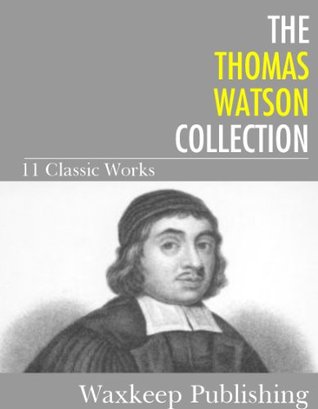- Bible
- Read the Bible
- Bible Versions
- Verse of the Day
- Reading Plans
- Verses by Topic
- Books of the Bible
- Bible Images
- Study
- Commentaries
- Concordances
- Dictionaries
- Encyclopedias
- Sermons
- Bible Atlas & Maps
- BP Wiki
- Devotionals
- Today's Devotionals
- Light of the World
- All Devotionals
- Inspirational Quotes
- More
- Picture Quotes
- Videos
- Inspirational
- Bible Study
- What The Bible Says
- Bible Q&As
- Daily Bread
- Bible by Genre
- Bible Stories
- Random Bible Verse
- Community
- Store
The Thomas Watson Collection: 11 Classic Works
by Thomas Watson
Waxkeep Publishing Collections provide history's greatest authors' collected works in a convenient collection complete with a linked table of contents. Waxkeep Publishing's goal is to provide the most complete, and most easy to read collections in the marketplace.
Waxkeep Publishing Collections provide history's greatest authors' collected works in a convenient collection complete with a linked table of contents. Waxkeep Publishing's goal is to provide the most complete, and most easy to read collections in the marketplace.The Thomas Watson Collection includes the following:
The Thomas Watson Collection includes the following:The Doctrine of Repentance
A Body of Divinity
The Christian Soldier
The Godly Man's Picture
The Lord's Prayer
The Ten Commandments
A Divine Cordial
A Treatise Concerning Meditation
The Mischief of Sin
The Fight of Faith Crowned
Religion Our True Interest (The Great Gain Of Godliness)
A Body of Divinity
The Christian Soldier
The Godly Man's Picture
The Lord's Prayer
The Ten Commandments
A Divine Cordial
A Treatise Concerning Meditation
The Mischief of Sin
The Fight of Faith Crowned
Religion Our True Interest (The Great Gain Of Godliness)
BUY NOW
Kindle Edition, 774 pages
Published April 28th 2013 by Waxkeep Publishing
© 2025 Bibleportal.com All rights reserved.

He was educated at Emmanuel College, Cambridge, where he was noted for remarkably intense study. In 1646 he commenced a sixteen year pastorate at St. Stephen's, Walbrook. He showed strong Presbyterian views during the civil war, with, however, an attachment to the king, and in 1651 he was imprisoned briefly with some other ministers for his share in Christopher Love's plot to recall Charles II of England.
He was released on 30 June 1652, and was formally reinstated as vicar of St. Stephen's Walbrook. He obtained great fame and popularity as a preacher until the Restoration, when he was ejected for nonconformity. Not withstanding the rigor of the acts against dissenters, Watson continued to exercise his ministry privately as he found opportunity. Upon the Declaration of Indulgence in 1672 he obtained a license to preach at the great hall in Crosby House. After preaching there for several years, his health gave way, and he retired to Barnston, Essex, where he died suddenly while praying in secret. He was buried on 28 July 1686.
Thomas Watson was an English, non-conformist, Puritan preacher and author.
He was educated at Emmanuel College, Cambridge, where he was noted for remarkably intense study. In 1646 he commenced a sixteen year pastorate at St. Stephen's, Walbrook. He showed strong Presbyterian views during the civil war, with, however, an attachment to the king, and in 1651 he was imprisoned briefly with some other ministers for his share in Christopher Love's plot to recall Charles II of England.
He was released on 30 June 1652, and was formally reinstated as vicar of St. Stephen's Walbrook. He obtained great fame and popularity as a preacher until the Restoration, when he was ejected for nonconformity. Not withstanding the rigor of the acts against dissenters, Watson continued to exercise his ministry privately as he found opportunity. Upon the Declaration of Indulgence in 1672 he obtained a license to preach at the great hall in Crosby House. After preaching there for several years, his health gave way, and he retired to Barnston, Essex, where he died suddenly while praying in secret. He was buried on 28 July 1686.
... Show more